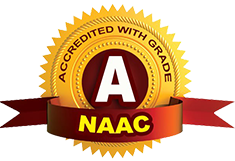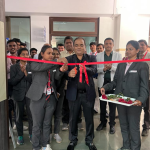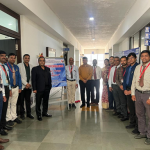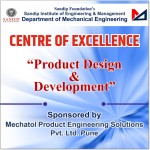Center of Excellence for Solid Works Mechanical
Solid works center of Excellence in Association with Dassault systems Through Addonix technologies PVT. LTD. 702/703 Vakratunda Corporate Park, off Aarey Road, Mumbai 400063 and Sandip Foundation’s Sandip Institute of Engineering and Management (SIEM), Mahiravani, Nashik an Educational institute registered under Savitribai Phule Pune University, and having its Registered office at At post Mahiravani, Trimbak Road, Nashik.
The purpose of MOU’s
- Education and Training: It can establish a framework for educational and training initiatives. This may involve providing access to SolidWorks software licenses for students and faculty, offering training programs or workshops, and ensuring that the institution’s curriculum is aligned with industry standards and practices.
- Internships and Placements: The MOU can facilitate internships and placement opportunities for students at the institution within the company. This benefits students by gaining real-world experience and helps the company identify potential talent for future employment.
- Software Licensing and Support: It can specify the terms under which SolidWorks software is licensed to the institution. This might include pricing, support, and maintenance arrangements to ensure that the software is up to date and functioning optimally.
- Joint Events and Conferences: It can outline plans for joint seminars, workshops, conferences, and other events that promote knowledge sharing and networking opportunities between the company and the institution.
- Long-term Relationship: An MOU often signifies a commitment to a long-term partnership, outlining the intentions of both parties to work together and support each other’s goals and objectives.
Objectives:
- Introduction to SolidWorks: Familiarize students with the SolidWorks user interface, menus, and basic navigation.
- 2D Sketching: Teach students how to create 2D sketches, including drawing lines, circles, rectangles, and other basic shapes.
- 3D Modeling: Enable students to create 3D models from 2D sketches, including extrusions, revolves, sweeps, and lofts.
- Assembly Design: Teach students how to create assemblies by combining multiple parts, adding constraints, and testing for interference.
- Parametric Modeling: Help students understand the concept of parametric modeling and how to use it effectively in SolidWorks.
- Part Design: Guide students in creating complex parts with features like fillets, chamfers, holes, and patterns.
- Drawing Creation: Show students how to generate 2D engineering drawings from 3D models, including dimensioning and annotations.
- Simulation and Analysis: Introduce students to simulation and analysis tools within SolidWorks for testing and validating designs.
- Design Optimization: Teach students how to optimize their designs for factors like weight, cost, and performance.
- Design Documentation: Help students understand the importance of proper documentation in engineering and how to create detailed design documents.
Outcomes:
- Proficiency in SolidWorks: Students should become proficient in using SolidWorks for 3D modeling and design tasks.
- Ability to create 3D Models: Students should be able to create complex 3D models from scratch or modify existing ones.
- Understanding of Parametric Modeling: Students should grasp the concept of parametric modeling and be able to make changes to their designs easily.
- Assembly Design Skills: Students should be capable of creating and manipulating assemblies of multiple parts.
- Simulation and Analysis Competency: Students should be able to use SolidWorks simulation tools to perform basic analyses on their designs.
- Effective Documentation: Students should be able to create accurate and comprehensive engineering drawings and design documentation.
- Problem-Solving Skills: Students should develop problem-solving skills in the context of design and modeling.
- Critical Thinking: Encourage students to think critically about design choices and trade-offs in their projects.
- Project Completion: Successful completion of design projects that demonstrate their knowledge and skills acquired during the training.
- Preparation for Industry: Equip students with the skills and knowledge needed for entry-level positions in engineering or design-related fields where SolidWorks is commonly used.
Faculty In charge:
Prof. S. S. Pote (Assistant Professor, Mechanical Engineering Department) & Addonix technologies PVT. LTD. Mumbai
Center of Excellence Product Design & Development Mechanical
Mechatol Product Engineering Solutions Pvt. Ltd Ketan Park, Second Floor, Opposite To Suraj Nagar Near Guruganesh Nagar Shantiban Chowk Kothrud, Pune -411038 and Sandip Foundation’s Sandip Institute of Engineering and Management (SIEM), Mahiravani, Nashik an Educational institute registered under Savitribai Phule Pune University, and having its Registered office at At post Mahiravani, Trimbak Road, Nashik has set a Centre of Excellence.
Mechatol Product Engineering Solutions Pvt. Ltd provides industrial product design and development services for product manufacturing. They are having specialization in designing mechanical products and static equipment’s required for manufacturing all under one roof. Their product design proficiency in taking products from initial concept, through design, analysis and validation, to final product specification, and into volume manufacturing provides an outstanding framework of our product success.
The purpose of this MOU is to enhance the skill, research, and development in Product Design & development sector.
- Collaboration Framework: It outlines the scope of the partnership and defines the specific areas of cooperation related to product design and development.
- Knowledge Sharing: It provides a mechanism for sharing knowledge and expertise. The Sandip institute of engineering & Management can offer access to its faculty, students, and research facilities, while the company can provide real-world industry insights, challenges, and resources.
- Research and Development: The MOU can specify research and development activities, including joint projects, experiments, and studies related to product design and development.
- Skill Development: Engineering students can benefit from hands-on experience and exposure to real-world projects, which can enhance their skills and make them more employable. The MOU can outline internships, co-op programs, and training opportunities for students.
- Resource Allocation: It can detail the allocation of resources, such as funding, equipment, and personnel, to support collaborative efforts
Objectives
- To give industry exposure to the students by allowing them to work on live projects
- To create awareness about standards and their use in industries.
- To provide Industrial Skills to the students of Sandip Institute Engineering and Management from employment perspective.
- To bridge the gap between university syllabus and industry requirements.
- To provide sponsorship industrial projects and summer /winter internship
Outcomes
- Proficient in Engineering Principles: – Participants should be able to apply engineering principles and theories to real-world projects.
- Effective Project Planning: – Participants can create detailed project plans, including timelines, milestones, and resource allocation.
- Innovative Design Development: – Participants can develop innovative engineering designs that meet project specifications and constraints.
- Practical Implementation Skills: – Participants can translate design concepts into physical prototypes or operational systems.
- Analytical and Problem-Solving Abilities: – Participants possess strong analytical skills and can effectively address engineering problems.
Product Design & Development Training
Candidates will receive training on following aspects for project execution (for Final year sponsorship students only)
| Training | Duration |
|---|---|
| Material Selection as per ASME & Ashby Property Chart | 8 Hours (1 day) |
| Material Costing | 8 Hours (1 day) |
| Welding Estimation as per AWS (American Welding Standard) | 8 Hours (1 day) |
| Bill of Material Standard , Excel Sheet Training | 8 Hours (1 day) |
| Process Planning | 8 Hours (1 day) |
| FEA and CFD (Solid works) | 8 Hours x 3 Days |
| 3D CAD Training | 8 Hours x 3 Days |
Scope of Work for Sponsored B.E Project:
- Creating GA Layout as per Mechatol Input
- Material Selections
- Product Calculations including Mechanical Sizing
- Costing and Product Estimation
- Designing the components in 3d CAD Software
- Creating Manufacturing and Fabrication Drawings
- Performing FEA & CFD Analysis for optimizing the design
- Generating Bill of Material
- Process planning sheet
Infrastructure
Mechatol Product Engineering Solutions Pvt Ltd. will be sponsoring following infrastructure for Sandip Institute of Engineering and Management, Nashik
- 42 INCH LCD (T.V) / LCD Projector
- 4 COMPUTER SET
- 3D Printer
- 4 QTY UPS
Faculty In charge:
Prof. S.B. Amabekar & Prof. K. P. Joshi (Assistant Professor, Mechanical Engineering Department)
Mr. Ananad Bhise (Mechatol Product Engineering Solutions Pvt. Ltd)
Center of Excellence for Machine Learning In Association With GB Softronics N 53 15-7 Rajratnanagar, Pawannagar Road, Cidco, Nashik – 422009 and Sandip Institute of Engineering and Management, Nashik an Educational Instiute affiliated to Savitribai Phule Pune University , and having a registered office at Post Mahiravani, Trimbak Road, Nashik.
The Purpose of MOU
Education and Training: It can provide a framework for educational and training initiatives. This involves providing training Programs, workshops and ensures that the curriculum is aligned with the industry standards and practices related with IT industry with emerging technologies on AI-ML-Deep Learning with various software platforms.
The Internship and Placements:
The MOU can facilitate internship opportunity in offline and online mode. The MOU will benefit preplacement training sessions specifically company oriented and supports for achieving placements.
Enhancing Programming Skills:
The MOU aims to improve programming Skills of the students and faculty in the domain of new edge technology like Artificial intelligence, Machine Learning, Deep Learning, Neural Networks, Generative AI
Joint Events and Conferences:
It can outline plans for joint events like workshops, conferences, STTPS, FDPs and seminars. This will help in promoting knowledge sharing, networking opportunities between company and institution. A platform for interaction between Academia and industry experts will be created to address industry needs and enhancing student employability.
Long Term Relationship:
An MOU signifies a commitment for long term partnership, outlining the interest of both parties to work together and support each other’s goals and objectives.
Objectives:
- Introduction to AI-ML-Deep Learning: Familiarize the students with the need of Neural Network concepts and applications in AI-ML-Deep Learning.
- Statistical Theory: Enhancing basics of statistical theory fundamentals, mathematical modelling, various signal Processing techniques.
- Image Processing Methodology: Enable the students with fundamentals of Digital Image Processing, various transforms, extracting data, features, using classifiers to enhance the performance parameters like accuracy, precision, etc.
- Data Science and Analysis Skills: Helps students to understand various data science tools to analyze the data, data filtration and representation.
- Programming Competency: Introduce various software’s required for Machine Learning, data science like MATLAB, Python, SQL, Java, pytorch, Panda and various libraries required.
- Programming Optimization: Enhancing programming skills to optimize the programs with various algorithms inclined with some specific data and performance parameters.
- Case Study Implementation: Helps students to work on various data available from standard resources and apply ML, AI, Deep Learning, Data Science algorithms to fulfil the objectives and achieve the best performance metrics.
- Project Documentation: Guide students to prepare industry standard project documentation, presentation slides, project report preparation using Latex tool.
Outcomes:
- Proficiency in Programming: Students should become proficient in using software’s like MATLAB, Python, SQL, Java.
- Ability to Data Presentation, Analysis: Students should be able to understand the data available, filtration of data, feature extraction and applying estimation models.
- Simulation and Analysis: The students should be learned various simulation environments based on various hypothesis designed and analyze the data based on standard parameters.
- Problem Solving Skills: Students should develop problem Solving skills based on industry problem statements.
- Critical thinking: Encourage students to think critically about Machine Learning, Data science algorithms with optimization approach and trade off in projects.
- Project Management: Student get the skills of Project Management to frame the project goals and the implementation with the time and resource management, deadlines assigned.
- Preparation for Industry: Equip Students with skills and knowledge required for entry level positions in software/IT industry where they can apply the programming skills in real time project implementations.
Faculty In charge:
Dr. M. K. Sangole (Asst. Professor, E&TC Engineering Department), Mr. Y. R. Risodkar ( Asst. Professor, E&TC Engineering Department) and GB Softronics Solution, Nashik.
Pre- requisites:
Software: MATLAB, Python, SQL, Java
Hardware: Machines equipped with Latest Configuration, high memory and processing capability inside the Signal Processing Lab of E&TC Department.
Activities Conducted:
- Online Training Program for Python Basics
- Workshop on Image Processing Basics with case study
- Development of Data Analytics Lab
- AICTE Funded STTP on Data Analytics
- Value Addition Programs on SQL
- Internship in support with Smart INDIA Hackathon
- Mini and Major Project Implementation with mentorship
Aksol Renewables Pvt Ltd, having corporate office at 221, Bodake Plaza, Dwarka, Nashik, Maharashtra, India-422011 and Sandip Foundation’s Sandip Institute of Engineering and Management (SIEM), Mahiravani, Nashik an educational institute registered under Savitribai Phule Pune University, and having its Registered office at At post Mahiravani, Trimbak Road, Nashik has set a Centre of Excellence.
India is endowed with a very vast solar energy potential with most parts of the country have about 300 sunny days and an average solar radiation incident over the land in the range of 4-7 kWh per day. International Energy Agency (IEA) estimates show that India’s solar potential is greater than 750 GW and its announced wind potential is 302 GW (actual could be higher than 1000 GW). India Energy Security Scenarios 2047 show a possibility of achieving a high of 479 GW of solar PV by 2047.
The purpose of this MOU is to enhance the skill and research and development in renewable energy sector.
- To undertake India specific application development that matches with behavioral pattern of the masses and adds value to their day-to-day activities both economic and
- To undertake cross-pollination of best practices world over and make it suitable in Indian context. This helps in creating optimal models that avoid duplication and wastage of resources especially in the field of Renewable Energy.
- Macro infrastructure planning that enables a systematic and sustained growth in a cost effective
- Creation of market ready talent pool and continuous talent building endeavor through training of the trainer.
- Integration and benchmarking of technology that can ultimately lead to form standards for manufacturing or rendering services.
- Create an environment of Innovation in the field of renewable energy to enable absorption of the current technology and develop future ready indigenous
Fund for the COE
| Requirement | Allocated Fund |
| Lab space / building Infrastructure | Rs. 1.5 Lakhs |
| Equipment and tools | Rs. 4 Lakhs |
| Research faculty, fellowship and Internship cost | Rs. 5 lakhs |
| Incubation / Entrepreneurship Development | Rs. 3 Lakhs |
| Seminar/Travel /Overhead/ Consumables/ Contingency | Rs. 1.5 Lakhs |
| Total amount for five years | Rs. 15 Lakhs |
Aksol Renewables Pvt Ltd is to provide 100 % budgetary support.
Major Activity of COE: Fundamentally the following types of activities will generally be undertaken at the centre of excellence:
- Continuous talent building: Create world-class human capital in the emerging & continuously evolving renewable energy domain through state-of-the-art training and development Post-graduate research initiatives, Post- doctoral/visiting positions up to 3 years and in-house research activities may be initiated.
- Application Oriented R&D: Revive and promote Applied Research and Development to adapt and sustain emerging and futuristic technologies in Indian and emerging market
- Cross pollination of ideas: Development of India specific solutions both for rural and urban applications derived from multiple technologies shall be carried gut. International collaboration with premier institutions and R &D centre shall be
- Benchmarking of Best Practices: Identifying and capturing best in class practices across countries, knowledge creation & sharing.
- Standardization Activities: The centre of excellence will provide excellent scope for active participation in the international standardization To provide the core strength and help the Coordination Centre to coordinate such that an active participation and representation takes place from the network of COE in the standardization forums.
- Apart from the/research and technology development that will be carried out within the financial support provided in 12(a), additional research and project activity shall be taken up on need basis from industry and other organizations with additional budgetary provision.
Faculty In charge:
Shantanu G. Pande (Assistant Professor, Civil Engineering Department) , Ms. Nikita Gangurde (Aksol Renewables Pvt Ltd)
Center of Excellence (CoE) in 3D Printing & Additive Manufacturing (Mechanical)
In association with: 3DShikshan Educational Consultancy.
The Center of Excellence (CoE) in 3D Printing & Additive Manufacturing is established to create a strong innovation ecosystem within the institute by integrating advanced manufacturing technologies with experiential learning. The CoE aims to empower students to explore their creativity, apply theoretical knowledge to real-world problems, and transform ideas into functional prototypes using state-of-the-art 3D printing technologies.
By embedding 3D printing into the academic curriculum and co-curricular activities, the CoE provides a deep, immersive, and hands-on learning experience that enhances conceptual understanding, practical skills, and industry readiness.
Purpose of the Memorandum of Understanding (MoU)
The purpose of this MoU is to collaboratively develop and nurture an innovation-driven learning environment where students can harness their true potential through experiential and project-based learning platforms. The partnership focuses on enabling students to:
- Convert creative ideas into working prototypes
- Simulate real-world engineering and design problems within the classroom
- Develop strong problem-solving, critical thinking, and analytical skills
- Foster self-learning, independent thinking, and rational decision-making
- Promote entrepreneurship and innovation-driven mindsets
The integration of 3D printing into education encourages students to become independent creators and solution providers rather than passive learners.
Objectives of the Center of Excellence
- To introduce students to 3D Printing and Additive Manufacturing technologies
- To bridge the gap between academic learning and industrial applications
- To promote hands-on, experiential, and interdisciplinary learning
- To enhance students’ creativity, innovation, and design thinking skills
- To support prototype development for academic projects, research, and startups
- To encourage entrepreneurship and product-based learning
Outcomes
- Improved practical understanding of engineering and design concepts
- Enhanced employability and industry-relevant skill development
- Development of innovative prototypes and proof-of-concept models
- Increased student participation in research, competitions, and startups
- Creation of a pool of skilled graduates proficient in emerging technologies
- Positioning of the institute as a pioneer in adopting advanced manufacturing technologies
Scope of Training and Activities
Under this collaboration, 3DShikshan Educational Consultancy will be facilitated as the preferred partner for conducting:
- Structured training programs on 3D Printing and Additive Manufacturing
- Hands-on workshops and certification courses
- Faculty Development Programs (FDPs)
- Student innovation bootcamps and prototype development sessions
- Awareness programs on emerging manufacturing technologies
Eligibility:
- Second Year and Third Year Degree students
Institutional Support:
- Allocation of specific time slots in the academic schedule for training programs
- Access to laboratory facilities, including computers and internet connectivity
Infrastructure and Facilities
The Center of Excellence is equipped with modern 3D printing infrastructure to support training, prototyping, and research activities.
Available 3D Printing Equipment
| Sr. No. | Printer Name | Technology | Quantity |
|---|---|---|---|
| 1 | Anycubic Cobra 2 | FDM Technology | 1 |
| 2 | Anycubic Cobra 2 Neo | FDM Technology | 2 |
| 3 | Anycubic Photon Mono 2 | SLA Technology | 2 |
These facilities enable students to work with both FDM and SLA technologies, providing exposure to a wide range of materials, design complexities, and industrial applications.
Benefits of the Collaboration
For Students:
- Hands-on exposure to cutting-edge manufacturing technology
- Opportunities to work on real-world problems and live projects
- Enhanced readiness for industry, higher studies, and entrepreneurship
For the Institute:
- Establishment as a leader in innovative and future-ready education
- Strengthened industry-academia collaboration
- Improved student outcomes, placements, and institutional reputation
For 3DShikshan Educational Consultancy:
- Opportunity to extend impactful learning solutions to a wider academic audience
- Collaborative development of innovation-driven educational models







